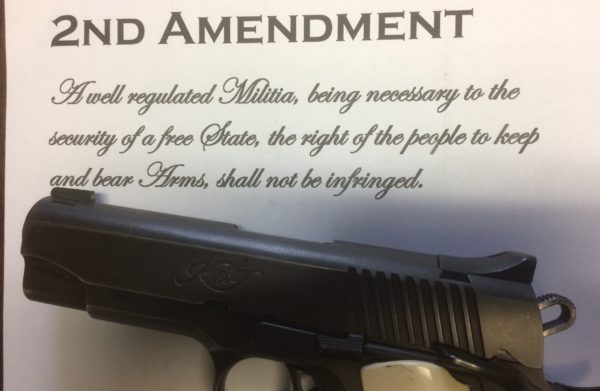
A guest essay published by the New York Times earlier this week contends Republicans in the South will be responsible for the deaths of their neighbors and constituents—including from gunshot wounds—because they are more concerned about “freedom” than in what writer Margaret Renkl says is a “public health emergency.”
According to Fox News, Renkl is a “liberal columnist” who blasted Southern Republicans for, among other things, “Instead of espousing common-sense gun laws that keep citizens safe, they ally themselves with the gun lobby,” and for offering “ludicrous platitudes on the subject of freedom.” Nobody has yet to define “common-sense gun laws” but the typical proposals offered by the gun prohibition lobby would essentially gut the Second Amendment and pose serious threats to the Fourth Amendment.
Meanwhile, writing at The Atlantic, David Frum—once a speech writer for former President George W. Bush, according to a short biography—laments that last year, U.S. citizens purchased “more than 23 million firearms,” including many who bought guns for the first time. Frum doesn’t like that, but what he appears to like even less is this:
“This fall, the Supreme Court will hear a case, New York State Rifle & Pistol Association v. Corlett, that could expand gun rights even further. Thirteen years ago, in District of Columbia v. Heller, the Court for the first time recognized people’s constitutional right to own firearms as individuals, not just as members of a ‘well regulated Militia.’ Now lawyers for the New York affiliate of the National Rifle Association will argue that the Second Amendment should be interpreted as granting a constitutional right to carry firearms in the streets, parks, playgrounds. If the NRA prevails, the nearly 400 million guns in the United States will show up in even more places than they do now.”
Gun rights advocates constantly remind anyone within hearing distance that the Second Amendment doesn’t “grant” anybody anything. It protects a right to keep and bear arms; a right that must certainly exist outside the confines of one’s home, else it is not a right at all, but a regulated privilege. A right to bear arms would mean to carry them outside the home, including walking down any street in the country, and visiting such places as parks and playgrounds.
Frum’s suggestion is to convince Americans one at a time to simply not buy a gun. It may ring hollow to people increasingly concerned about their own safety in the midst of shrinking police department manpower in some agencies. For example, MyNorthwest.com is reporting the Seattle Police Department could lose 200 or more officers over a COVID vaccine mandate by lame duck Mayor Jenny Durkan. The number of active concealed pistol licenses in Washington State, and particularly in King County where Seattle is located, is on the upswing following a COVID-induced decline of more than 30,000 active CPLs between April 2020 and April 2021. But the number has rebounded, with more than 17,000 active licenses added back to the rolls across the state, including 2,730 additional CPLs in King County between April 30 and Aug. 31.
One common impression emerging from both essays is that the arguments presented therein are based on emotion. At one point Frum estimates there are “nearly 400 million guns in the United States.”
A check of the FBI Uniform Crime Report shows less than 15,000 homicides in any given year over the past several. Frum estimates “Half of the almost 48,000 suicides (roughly 24,000 by his estimate) committed in 2019 were carried out by gun.” Add the estimated 500 “accidental deaths” involving firearms (Frum’s number) and the total still amounts to a fraction of all the firearms in private ownership being used or misused with tragic results.
Check Internet search engines for stories involving felons with firearms, and it becomes quickly evident that gun control laws purported to keep guns out of the wrong hands have been failing for decades. Logic, not emotion, suggests that in such an environment, people will take more responsibility for their own safety instead of calling for help that may not be coming.
So the new approach is to simply talk people into not owning guns. Countering this lofty goal is a meme often floating around social media which asserts unarmed citizens in peril invariably call on people with guns (law enforcement) to rescue them.
Gun owners rarely insist that everyone should own a firearm. Instead, the typical gun owner figures this is a personal decision. Anti-gunners, on the other hand, insist that nobody should own a firearm, or that such ownership should be so strictly regulated as to make it an impossible consideration.
This is the difference, argue many in the gun rights community, between a culture of “freedom” and something else that invariably becomes a state in which freedom is a fleeting memory.